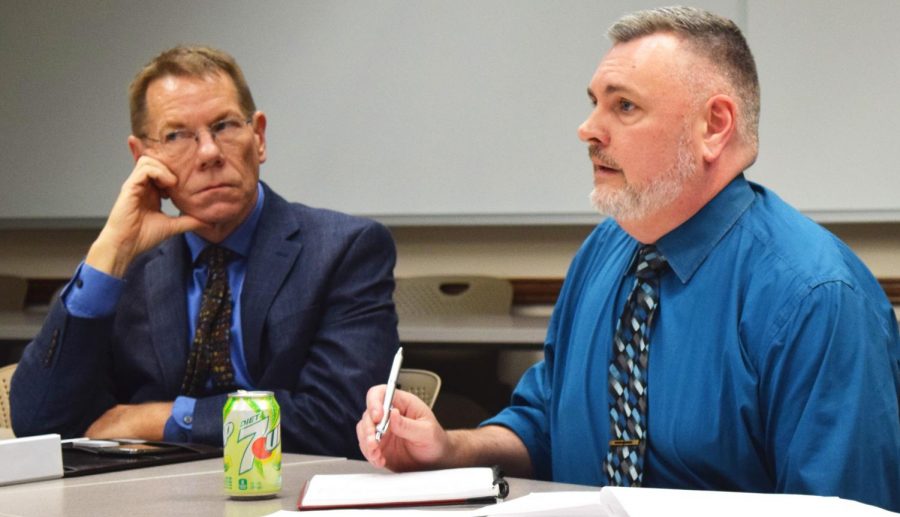Review committee discusses 13-week schedule, four day school week
Institutional Repository Librarian Todd Bruns gives his opinion on the possible four-day weekly schedule change. He said that although it seemed like a good idea at first, it may not be feasabile campus-wide.
November 5, 2017
A 13-week semester schedule and a four-day weekly schedule were two different shortened schedules considered at Friday’s Workgroup Review Committee meeting.
With the 13-week schedule, classes would start after Labor Day. The committee said it would also provide faculty time for scholarly activities, as well as giving students time to participate in student success programs and undergraduate research.
Biological sciences professor Billy Hung said he thought the two weeks that would be shaved off could be used to further benefit students, either with community service or a capstone project.
“The idea that I have is yeah, you do your class work in thirteen-weeks, and then the extra two weeks that we shaved off is part of their … research topic, so that they don’t have to worry about classes when they’re trying to do their research activities,” Hung said.
Classes would be longer and a system would need to be devised to account for the faculty’s scholarly activities. Other problems would be making sure students still receive the hours they need for financial aid packages and that the public might see faculty as doing less work than before.
Jeannie Ludlow, an English professor and the coordinator of women’s studies, said with a shorter schedule the public might think better of the university and its faculty.
“Too many people who are in the public that we serve think that people are wasting their time in college anyway,” Ludlow said. “I think if we tell them it’s a shorter time, they’ll be thrilled to death.”
Although there were concerns about condensing curriculums into 13 weeks, Hung said the proposal would be possible with a great deal of effort.
“This is doable, in terms of feasibility, but the question is will it be worth the effort to implement,” Hung said. “If we change it to 13, yes, we could do it, with A, B, C and D we could do it. The question is, ‘is it worth the effort for the gains we could have?’”
The committee discussed the other shorter schedule option, a four-day weekly schedule, with the pos-sibility of an EIU day on Friday set aside for meetings and guest speakers. Very quickly, the committee decided that a four-day week schedule was not feasible, and decided to consider the possibility of changing the proposal to a half-day or three-hour block instead.
One aspect of this proposal that was intriguing, Hung said, was the ability of a set time for meetings to allow more faculty members to get more involved on campus.
“We do enable faculty to do campus level service more readily. A lot of committees that do a lot of work take a lot of time, (Council on Academic Affairs,) Faculty Senate, (Graduate Student Association,) some of those meetings are two hours long, and it’s hard to schedule classes around them,” Hung said. “So if there’s a block of time reserved for those longer service hours that will facilitate faculty participating in those services.”
Stephen Lucas, the interim associate dean of the College of Education and Professional Studies, said that even setting aside a two-hour block would not be feasible for the education department.
Shared concerns about fitting labs, classes and practicum around a certain time block were addressed by Denise Smith, interim chair of the College of Business and Applied Sciences, who said even though her college does not struggle with the issue of setting aside time on Fridays, requirements of other colleges might make it near impossible to have that time.
Further discussion on shortened schedules was tabled to allow members to ruminate on the ideas presented at the meeting.
For future meetings, the committee plans to focus on shorter schedules, the restructuring of colleges and program proposals.
Note: The committee’s minutes and charge are on it’s website, goo.gl/5Tf55q and are open for anyone to see.
Brooke Schwartz can be reached at 581-2812 or bsschwartz@eiu.edu.





































































